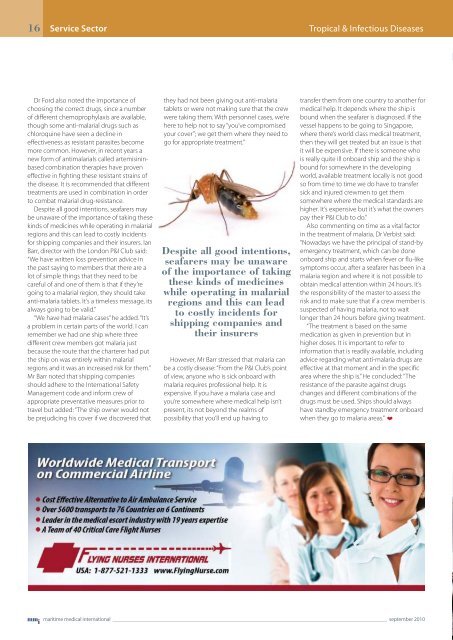Create successful ePaper yourself
Turn your PDF publications into a flip-book with our unique Google optimized e-Paper software.
16 Service Sector Tropical & Infectious Diseases<br />
Dr Ford also noted the importance of<br />
choosing the correct drugs, since a number<br />
of different chemoprophylaxis are available,<br />
though some anti-malarial drugs such as<br />
chloroquine have seen a decline in<br />
effectiveness as resistant parasites become<br />
more common. However, in recent years a<br />
new form of antimalarials called artemisininbased<br />
combination therapies have proven<br />
effective in fighting these resistant strains of<br />
the disease. It is recommended that different<br />
treatments are used in combination in order<br />
to combat malarial drug-resistance.<br />
Despite all good intentions, seafarers may<br />
be unaware of the importance of taking these<br />
kinds of medicines while operating in malarial<br />
regions and this can lead to costly incidents<br />
for shipping companies and their insurers. Ian<br />
Barr, director with the London P&I Club said:<br />
“We have written loss prevention advice in<br />
the past saying to members that there are a<br />
lot of simple things that they need to be<br />
careful of and one of them is that if they’re<br />
going to a malarial region, they should take<br />
anti-malaria tablets. It’s a timeless message, its<br />
always going to be valid.”<br />
“We have had malaria cases” he added. “It’s<br />
a problem in certain parts of the world. I can<br />
remember we had one ship where three<br />
different crew members got malaria just<br />
because the route that the charterer had put<br />
the ship on was entirely within malarial<br />
regions and it was an increased risk for them.”<br />
Mr Barr noted that shipping companies<br />
should adhere to the International Safety<br />
Management code and inform crew of<br />
appropriate preventative measures prior to<br />
travel but added: “The ship owner would not<br />
be prejudicing his cover if we discovered that<br />
they had not been giving out anti-malaria<br />
tablets or were not making sure that the crew<br />
were taking them. With personnel cases, we’re<br />
here to help not to say “you’ve compromised<br />
your cover”; we get them where they need to<br />
go for appropriate treatment.”<br />
Despite all good intentions,<br />
seafarers may be unaware<br />
of the importance of taking<br />
these kinds of medicines<br />
while operating in malarial<br />
regions and this can lead<br />
to costly incidents for<br />
shipping companies and<br />
their insurers<br />
However, Mr Barr stressed that malaria can<br />
be a costly disease: “From the P&I Club’s point<br />
of view, anyone who is sick onboard with<br />
malaria requires professional help. It is<br />
expensive. If you have a malaria case and<br />
you’re somewhere where medical help isn’t<br />
present, its not beyond the realms of<br />
possibility that you’ll end up having to<br />
transfer them from one country to another for<br />
medical help. It depends where the ship is<br />
bound when the seafarer is diagnosed. If the<br />
vessel happens to be going to Singapore,<br />
where there’s world class medical treatment,<br />
then they will get treated but an issue is that<br />
it will be expensive. If there is someone who<br />
is really quite ill onboard ship and the ship is<br />
bound for somewhere in the developing<br />
world, available treatment locally is not good<br />
so from time to time we do have to transfer<br />
sick and injured crewmen to get them<br />
somewhere where the medical standards are<br />
higher. It’s expensive but it’s what the owners<br />
pay their P&I Club to do.”<br />
Also commenting on time as a vital factor<br />
in the treatment of malaria, Dr Verbist said:<br />
“Nowadays we have the principal of stand-by<br />
emergency treatment, which can be done<br />
onboard ship and starts when fever or flu-like<br />
symptoms occur, after a seafarer has been in a<br />
malaria region and where it is not possible to<br />
obtain medical attention within 24 hours. It’s<br />
the responsibility of the master to assess the<br />
risk and to make sure that if a crew member is<br />
suspected of having malaria, not to wait<br />
longer than 24 hours before giving treatment.<br />
“The treatment is based on the same<br />
medication as given in prevention but in<br />
higher doses. It is important to refer to<br />
information that is readily available, including<br />
advice regarding what anti-malaria drugs are<br />
effective at that moment and in the specific<br />
area where the ship is.” He concluded: “The<br />
resistance of the parasite against drugs<br />
changes and different combinations of the<br />
drugs must be used. Ships should always<br />
have standby emergency treatment onboard<br />
when they go to malaria areas.” ❤<br />
maritime medical international ________________________________________________________________________________________________________ september <strong>2010</strong>


